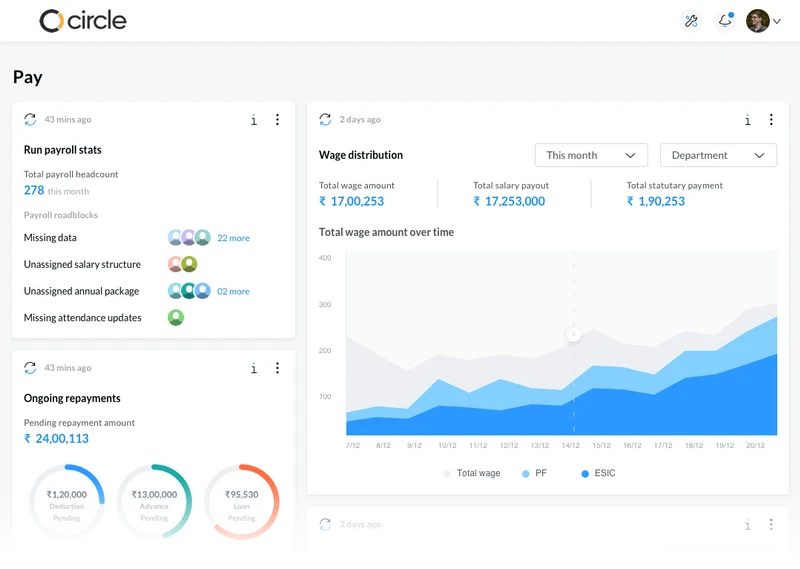In a tight labor market, using modern compensation best practices can make all the difference in propelling your organisation to success, attracting potential job seekers, and retaining high-performing employees. A study reveals that about 70.3% of the total organisational costs are compensation alone. When such a huge amount is involved, it becomes more than essential for the human resource management team to be vigilant regarding compensation management.
Fair and transparent compensation practices, salary keeping up with the climb, ensuring that your compensation matches the market trend, and offering competitive perks and benefits are key. Incorporating all the key practices and components and developing an effective compensation strategy can be challenging. Hence, here are 7 key practices that can help you get it right.
Top 7 Ways to build an Effective Modern Strategy
1. Take cues from from industry trends
Keeping tabs on the latest market trends is a good idea in business. This includes keeping an eye on what your competitors are paying, how often they’re offering raises, the annual per cent increase, and how much they budget for an average salary increase.
A vigilant human resource management works by gathering intelligence about these elements, helping you compete for new hires and negotiate more effectively with your current employees.
One way to get this done is to invest in salary surveys. Salary surveys are extremely powerful tools for benchmarking compensation and benefits. They provide meaningful insights about employee salaries and benefits across different industries, regions, and job levels. The information provided by salary surveys enables companies to make informed business decisions about salary ranges.
Another way could be to avail of a compensation consultant’s services or those of dedicated compensation consulting services. A compensation consultant is an expert who assists organisations in implementing and designing compensation plans to draft the proper incentives for employee behaviour.
2. Build a strong compensation philosphy
Every salary structure is based on a compensation philosophy. A well-structured compensation philosophy greatly influences company culture. It encompasses an organisation’s strategic plan and initiatives, business goals (both long-term and short-term), competitive outlook, operating objectives, and reward strategies.
While building a strong compensation philosophy, the most important thing to consider is to conduct an equity analysis – decide between internal and external equity at each level.
External equity is payment equality compared to people in similar positions working in different organisations.
On the other hand, internal pay equity analysis compares the employee’s position within the organisation to ensure that all the employees in the same position are paid equally and fairly.
While focusing on internal equity helps the organisation achieve inclusion, belonging, and strong engagement, external equity is critical to keep the organisation competitive and to attract and retain employees.
For instance, top management is less likely to move on to another job as they have invested their career with the company. Hence, the executive compensation approach would focus on internal equity.
3. Recognition and Rewards are important
Glassdoor’s Employee Appreciation Survey found that 53% of employees admit they would stay longer at their company if they received more appreciation from their boss. Therefore, a formal recognition process helps individuals celebrate their achievements.
An effective compensation program includes a reward and recognition process. Recognition can be in the form of simple spoken or written thank-you notes, highlighting success stories of an employee in the company’s newsletter or utilising a wall of fame to appreciate employees.
In addition to performance, organisations can also recognise employees for non-work accomplishments, such as celebrating their association with the company, work anniversary etc. Recognising one’s services inculcates a feeling of belongingness and inclusion and, hence, can be an effective way of talent retention.
Another way of effectively combining the recognition program with the compensation strategy would be tying bonuses to clear pre-agreed targets. This gives employees an idea about the total compensation available to them.
4. Focus on comprehensive compensation budgeting
Thoughtful and comprehensive compensation budgeting eliminates surprises. It gives you essential financial data to manage your business and keeps employees motivated and committed to the company’s goals.
A well-designed budget allocation determines how much of the total compensation budget will be spent on salary and what percentage will be spent on benefits and other incentives.
For instance, for a budget of INR 1,00,000 for compensation, if 90% is salary and 10% is benefits, you need to determine how to spend that 10%. Different employees expect different benefits. As per a study, 90% of employees intend to continue working in a company when their well-being needs are fulfilled.
Under such circumstances, the compensation team can divide the 10% benefit as under:
7% on employee health benefits, 2% on retirement savings, and 1% on tuition reimbursement totalling 10%.
5. Communicate your plan to the employees
All your employees should be informed whenever you introduce your compensation plan. Call a meeting to launch the plan and follow up with emails. Use all your communication channels to communicate with employees. At the end of the meeting, make sure to hand a memo to each employee.
This memo will include their current rate and new rate of increase, the effective date of the increase, which payment period will reflect the increase, and the reasons for the pay revisions.
Money is an extremely sensitive topic. Employees have a lot of uncertainty, hope, and concern about their compensation, especially during job/project changes and transitions. Organisations must always consider how employees are likely to feel about pay revisions and changes in the compensation package.
It falls under the purview of HR roles and responsibilities to notify the employees about the process well in advance and keep them involved in the conversation. You must be precise and transparent when communicating the changes.
6. Keep criteria specific and measureable
An effective compensation strategy is based on specific, quantifiable, and verifiable factors. While it is completely up to an organisation to decide which legal factors to consider, education, experience, and geographic locations are a few to consider. Instead of a one-size-fits-all approach or vague criteria such as “seniority,” opt for more tangible factors like designation or job functions that can be clearly measured.
Job levels, when combined with competencies, not only add structure to compensation decisions but also help foster employee growth and development. With specific and measurable information attached to each role, compensation professionals can set ranges or pay bands while considering individual performance and skills.
7. Try compensation management software
Be it a small or a big organisation, every business leader and HR professional knows that to retain top talent, companies must take a calculated approach to compensation planning. Moreover, in-depth compensation planning requires more than spreadsheets.
Comprehensive compensation management software provides a centralised platform where you can gather, store, and analyse all your data in one place, with track changes and history logs. It takes the human resource management department beyond manual spreadsheets and ensures a well-designed compensation planning solution.
As a compensation consultant, the software generates a compensation review plan to showcase to the senior management per different metrics. It takes care of everything from strong planning and budgeting to forecasting functions that track headcount and salaries as per the available data.
A survey reveals that 64% of employees prefer being remote workers, while 45% of employees prefer more of a hybrid work model. Hence, with more and more companies adopting a hybrid work model, this software becomes important to keep a tab on remote workers.
The beauty of this software resides in that you can explore unlimited opportunities with varied incentive plans without increasing your workload. From computing cash incentives, equity awards, result-based pay, and performance management to keeping up with fragmentation, divergent trends, and personalisation, the software can assist at all levels of compensation management.
Wrapping Up
A comprehensive compensation strategy is integral to your overall organisational strategy for keeping your team motivated and performing at their best. Drafting a company’s compensation strategy demands a strategic approach involving investment in engagement, development, and performance management to build a great workplace where employees thrive.
sumHR is a platform that transforms how companies approach people strategy by connecting best human resource practices and career growth in one unified solution. It is the leading software that allows users to build a robust and fully digital human resource information system (HRIS). sumHR is a singular automated platform for managing employee attendance, compensation components, performance review, payroll, and much more.
Frequently Asked Questions
1. What is the need for a strong compensation philosophy?
A strong compensation philosophy ensures a low burn rate, streamlined pay, and reward system, and fair and transparent pay practices. This enhances employee retention and the overall growth of the organisation.
2. I need to draft a compensation strategy for my company from scratch. How do I begin?
The first and foremost step is to conduct an industry analysis. Learn about the compensation and reward system of the industry your company is working in and set a benchmark accordingly. This ensures an effective and competitive compensation strategy.
3. How can organizations ensure a transparent compensation strategy?
Ensure your employees are aware of the compensation plans in place and are informed about all the changes/modifications of the existing compensation plan. Use various communication channels like the intranet, newsletters, town hall meets, etc., to ensure every employee knows the compensation policy.
Fair and transparent compensation practices, salary keeping up with the climb, ensuring that your compensation matches the market trend, and offering competitive perks and benefits are key. Incorporating all the key practices and components and developing an effective compensation strategy can be challenging. Hence, here are 7 key practices that can help you get it right.








